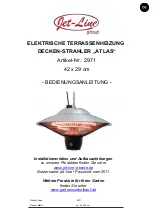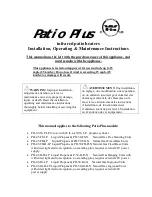
49
SECTION IX: OPERATING INSTRUCTIONS
WARNING
Water heaters are heat-producing appliances. To avoid damage or injury there must be no materials
stored against the water heater or direct vent system, and proper care must be taken to avoid
unnecessary contact (especially by children) with the water heater and direct vent system. UNDER NO
CIRCUMSTANCES SHOULD FLAMMABLE MATERIALS, SUCH AS GASOLINE OR PAINT THINNER
BE USED OR STORED IN THE VICINITY OF THIS WATER HEATER OR IN ANY LOCATION FROM
WHICH FUMES COULD REACH THE WATER HEATER.
Installation or service of this water heater requires ability equivalent to that of a licensed tradesman in
the field involved. Plumbing, air supply, venting, gas supply and electrical work are required.
Light the unit in accordance with the operating instructions label attached to the water heater.
Under no circumstances should the input rate exceed the input rate shown on the water heater rating
plate. Over firing could result in damage or sooting of the water heater.
If the unit is exposed to the following, do not operate water heater until all corrective steps have been
made by a factory authorized independent service contractor or qualified service professional.
1. Flooding to or above the level of the burner or controls
2. External
firing
3. Damage
4. Firing
without
water
5. Sooting
NEVER OPERATE THE WATER HEATER WITHOUT FIRST BEING CERTAIN IT IS FILLED WITH
WATER AND A PRESSURE RELIEF VALVE IS INSTALLED IN THE HOT WATER OUTLET PIPING
OF THE WATER HEATER.
GENERAL INSTRUCTIONS
TO FILL THE WATER HEATER
1. Close the water heater drain valve by turning the knob or valve stem clockwise.
2. Open the cold water supply shut-off valve.
3. Open several hot water faucets to allow air to escape from the system.
4. When a steady stream of water flows from the faucets, the water heater is filled. Close the
faucets and check for water leaks at the water heater drain valve, pressure relief valve and the
hot and cold water connections.
SEQUENCE OF OPERATION
1. Water heater senses the minimum operating water flow which starts the ignition sequence to light
the burners.
2. Blower
ON
3. Pressure switch proves blower operation
4. Gas valve opens and spark igniter starts.
5. Main burner ON
6. Flame
signal
confirmed
7. Burner flame and combustion blower modulates to maintain selected outlet temperature
8. Water flow is also regulated to not exceed the capacity of the water heater for the temperature
selected.
9. Water flow shuts off.
10. Burners shut off immediately, but combustion blower continues for another 65 seconds to purge
heat from coil.
Summary of Contents for IGI-180R-10N
Page 7: ...7 EVERHOT IGI Model Series Dimensions Figure 1...
Page 14: ...14 Recommended Piping for a Basic Installation Figure 2...
Page 15: ...15 Recommended Piping for a Circulation System Figure 3...
Page 35: ...35 Horizontal Vent System Installation examples Figure 36...
Page 38: ...38 Vertical Vent System Installation examples Figure 40...
Page 39: ...39 Cut Line Template Figure 41...
Page 44: ...44 Wiring Diagram Schematic Figure 43...
Page 59: ...59 Schematic Diagram of Internal Parts Figure 53...
Page 61: ...61 Internal Components...
Page 62: ...62 Internal Components...
Page 63: ...63 Electrical Components...
Page 67: ...67 NOTES...
















































